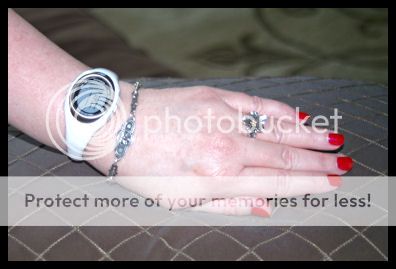Just out of curiosity .. Can those who are using the ones with straps not tell when their heart rate is up ? I can't tell if my bp is up or down but I can't miss my heart pounding or racing.
Yes, I can tell
when my heart is going somewhat faster but I can't tell
how much faster it is going. I think I have learned to ignore my heart rate so much over the years that I just block it out and keep on going. Also, compared to the
other type of tachycardia that I've had since I was 11 years old, a short circuit in my heart that makes my heart switch from 70-80 BPM to 180-190 BPM within the space of a single heart beat, then a heart rate of 120-140 BPM doesn't seem all that fast. (FYI, that other type of tachycardia was never disabling, never stopped me from exercise, work, etc).
I posted someplace on the forums that it wasn't until I was testing my blood pressure while standing that I noticed that my heart rate can get as high as 150 BPM. And it happens very quickly, just while standing still long enough to take my blood pressure. So, while I knew my heart was going faster while standing, it was a surprise to me that it was going that fast. I did know that moving around was better than standing still (my heart rate is generally slower while walking that while standing still).
If so, what does that mean ? Can you go up stairs without getting winded too ?
What are these "stairs" that you speak of?

Seriously, I avoid stairs and always use the elevator. My house is single level for that very reason (we moved after I got sick -- one of the reasons was that although our old house was also single level there were seven steps at the front door to get into the house).
My heart pounds quickly upon rising so that's why I can.t understand monitoring it so closely .. My alarm would never stop .. Lol .
I don't think I'm quite as limited as you are, and also have a larger range of heart rate (it goes down into the 70s or even 60s when I'm resting), but I also had trouble wearing one of the heart monitors even around the house (let alone outside). E.g., I set the alarm for 115 BPM, which I thought was on the high end, and wore it around the house for a few hours. I was hoping it would be a way to tell me when to rest. But, as you said, the alarm was going off all the time, pretty much any time I got up to do something (walk to kitchen, go to bathroom, or anything at all).
I used it a few times, just to get an idea of what types of things caused my heart to go faster, but could not manage to wear it more regularly. That alarm is extremely annoying. I can't imagine trying to wear it outside of the house.
Sometimes pushing past the heart pounding feeling helps .. And sometimes laying down is required.
I haven't had much luck with pushing but I'm glad it works for you sometimes. What helps me most is a few minutes activity (e.g., doing dishes) interspersed with a few minutes rest. So, instead of trying to finish a task completely, I break it into small bits. The other thing that helps me even more is sitting down as much as possible while doing any type of task. (Resting in a recliner with my feet up in between tasks is taken as a given!) I have a chair in every room - a bar stool in the kitchen that I can slide around from sink to counter, a chair in front of the bathroom sink/mirror, a seat in the shower, and so on. I don't know how much this will help folks with POTS but it's very helpful for me (primary problem is NMH).
Um, I thought the heart pounding right away was normal for me/cfs. Maybe, it's only normal if you have OI all the time. I'm still learning about dysautonomia .
I do think the heart rate increase (not sure if that's what you mean by pounding) is usually due to some type of OI. But maybe there are other reasons for it as well.
I hope this helps... sorry if it is too much of a tangent from the original post!

